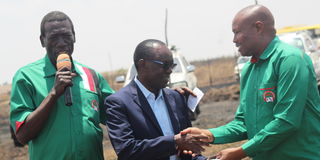Unreleased capitation hurting school operations

Kenya National Union of Teachers (Knut) Secretary-General Collins Oyuu (left), Samburu branch secretary Richard Lentayaa, and first national vice chairman Malel Langat at Losuk in Samburu West constituency during the burial of Nancy Nampiyan Lentayaa (Mr Lentayaa's mother) on 1 March 2025. Mr Oyuu called on the government to release capitation funds to schools facing financial crisis
While public schools struggle with the basics of CBC implementation, private schools are seamlessly integrating the curriculum, benefiting from state-of-the-art infrastructure and abundant resources.
Education as an equaliser can only be realised if quality is maintained uniformly, without exposing learners to vastly different standards of education, a situation that fosters unfair competition.
Social media has been awash with images and videos of public schools in deplorable conditions, some using water tanks as classrooms, while others conduct lessons under trees, exposed to harsh weather. For students in such schools, essential facilities such as laboratories, libraries, textbooks, and adequate teaching staff remain a luxury and an unattainable dream.
The Treasury Cabinet Secretary recently announced that the government would not remit the capitation arrears owed to schools from the previous financial year. Even more concerning is that the disbursement for Term One 2025 was made in arrears.
With reduced capitation, the first casualties are co-curricular activities. Many schools have already opted out of Term One competitions, including athletics and drama festivals. Yet, these activities play a crucial role in shaping learners’ personalities and social skills beyond school.
Cooperation, coordination, teamwork, and overcoming stage fright are best nurtured through outdoor engagements such as sports, science fairs, inter-school debating competitions, symposiums, trips, and excursions. The CBC curriculum emphasises such activities, particularly for learners whose competencies align with the Arts and Sports Science pathways.
Consequently, private schools will continue to produce well-rounded learners, while many public schools will struggle to do the same. The stark difference in exposure means education will cease to be an equaliser and instead become a dividing factor.
The government must urgently release the funds owed to schools; otherwise, the situation will deteriorate further. If this trend persists, it will not be long before operations in most public schools grind to a halt.
Wornicks Gisemba, Kajiado

